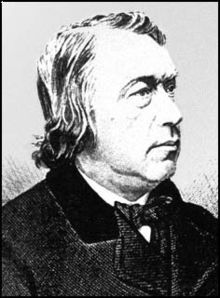- Charles Mackay
-
This article is about the Scottish author. For the American arts administrator, see Charles MacKay (US arts administrator).
Charles Mackay (27 March 1814 – 24 December 1889) was a Scottish poet, journalist, and song writer.
Life
Charles Mackay was born in Perth, Scotland. His father was by turns a naval officer and a foot soldier; his mother died shortly after his birth. Charles was educated at the Caledonian Asylum, London, and at Brussels, but spent much of his early life in France. Coming to London in 1834, he engaged in journalism, working for the Morning Chronicle from 1835–1844 and then became editor of the Glasgow Argus. He moved to the Illustrated London News in 1848, becoming editor in 1852.
He published Songs and Poems (1834), a History of London, Extraordinary Popular Delusions and the Madness of Crowds (1841), and a romance entitled, Longbeard. He is also remembered for his Gaelic Etymology Of The Languages Of Western Europe[1] and the later Dictionary of Lowland Scotch[2] in which he presented his "fanciful conjectures" that "thousands of English words go back to Scottish Gaelic". The linguist Anatoly Liberman[3] has described MacKay as an "etymological monomaniac" commenting that "He was hauled over the coals by his contemporaries and never taken seriously during his lifetime".[4] His fame chiefly rested upon his songs, some of which, including "Cheer, Boys, Cheer", were set to music by Henry Russell in 1846, and had an astonishing popularity.
Charles Mackay wrote the popular poem You have no enemies, you say?:
You have no enemies, you say?
Alas, my friend, the boast is poor,
For those who have mingled in the fray
Of duty, that the brave endure,
Must have made foes.
If you have none,
Small is the work that you have done.
You’ve hit no traitor on the hip,
You’ve dashed no cup from purjured lip,
You’ve never set the wrong to right.
You’ve been a coward in the fight.
Mackay visited North America in the 1850s publishing his observations as Life and Liberty in America: or Sketches of a Tour of the United States and Canada in 1857-58 (1859). During the American Civil War he returned there as a correspondent for the Times, in which capacity he discovered and disclosed the Fenian conspiracy.He had the degree of LL.D. from the University of Glasgow in 1846. He was a member of the Percy Society. He died in London. His daughter was the novelist Marie Corelli.
References
- ^ The Gaelic Etymology Of The Languages Of Western Europe, And More Especially Of The English And Lowland Scotch And Of Their Slang, Cant And Colloquial Dialects (1877)
- ^ MacKay, Charles (1888) A Dictionary of Lowland Scotch, London, Whittacker & Co.
- ^ The author of Word Origins…And How We Know Them, Oxford University Press, USA, 2005 and An Analytic Dictionary of English Etymology: An Introduction University Of Minnesota Press, 2008
- ^ Oxford Etymologist
This article incorporates text from a publication now in the public domain: Cousin, John William (1910). A Short Biographical Dictionary of English Literature. London, J. M. Dent & Sons; New York, E. P. Dutton.
External links
Categories:- 1814 births
- 1889 deaths
- Scottish poets
- Scottish journalists
- People from Perth and Kinross
Wikimedia Foundation. 2010.

